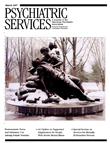Creating integrated service systems for homeless persons with mental illness: the ACCESS Program. Access to Community Care and Effective Services and Supports
Abstract
The Access to Community Care and Effective Services and Supports (ACCESS) demonstration program was initiated in 1993 by the U.S. Department of Health and Human Services as part of a national agenda to end homelessness among persons with serious mental illness. Demonstration projects have been established in nine states to develop integrated systems of care for this population. This paper provides an overview of the ACCESS program and presents definitions of services integration and systems integration. Evaluating the effectiveness of integration strategies is a critical aspect of the program. The authors describe the evaluation design and the integration strategies being evaluated and summarize findings from a formative evaluation of the project's first two years. The evaluation revealed several problems that were addressed by providing technical assistance to the states. States were helped to articulate a broader mission of addressing system- level barriers, develop an expanded plan, strengthen the authority of interagency councils, involve leaders at the state and agency levels, and develop joint funding strategies.



